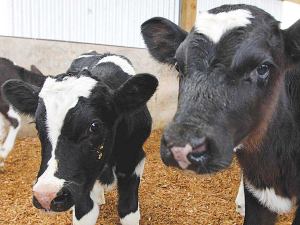Allied holds back dividend
Listed livestock trader Allied Farmers is retaining earnings and not paying shareholders a dividend for the 2023 financial year.
 Allied Farmers chairman Richard Perry says the poor returns from the veal processing operations continue to have a major impact on performance.
Allied Farmers chairman Richard Perry says the poor returns from the veal processing operations continue to have a major impact on performance.
Allied Farmers posted a better-than-expected net profit of $531,000 for the six months ending December 31, 2020.
While ahead of budget and forecast, it is less than 50% of last year’s half-year profit of $1.18 million, hit by poor veal processing returns by subsidiary New Zealand Farmers Livestock (NZFL).
In a statement to NZX, Allied Famers chairman Richard Perry says the poor returns from the veal processing operations continue to have a major impact on first half year performance.
“However, investors are reminded that typically Allied Farmers’ second half year profit is driven by factors distinct from the veal processing results that drive first half year profit,” he adds.
“The second half is strongly influenced by livestock trading and herd sale activity, much of which will occur in the later part of the second half, and therefore it is not possible to forecast full year profits based on first half performance.”
Perry says despite the challenges of 2020, Allied Farmers is starting 2021 in a strong position the board is “excited about the future”.
Via investments in new companies, and shareholder approval to raise up to an additional $5 million of new capital via placements, Allied Farmers is keen to expand its footprint in the ag sector.
“In particular, and as previously indicated, the intention is to invest into the growth of our finance subsidiary, Rural Funding SolutioNZ, to widen and improve our rural finance offering,” Perry says.
“In addition, we continue to evaluate opportunities in the AgriTech space.”
The company says the NZFL result was dominated by Covid-related impacts on veal business revenues. “However, NZFL finished the half year ahead of expectations despite the challenging conditions facing its business divisions.”
Perry says its livestock agency business saw lingering drought concerns impacting trading behaviour early in the period, softer stock pricing in line with red meat schedules and pleasing market share and tallies later in the half year. Dairy stock prices have held well to date and some movement in dairy farm sales and forecast milk payouts bode well for herd sale volumes in the second half.
“NZFL is committed to a strategy of providing a superior service to its farmer clients to assist them to be successful in the operation of their own businesses.”
The veal processing and trading profit was well behind the prior year, but in line with budgeting for a severely Covid-affected year.
“This largely reflects foodservice impacts, skin pricing changes, and the strengthening New Zealand dollar. Delivering a profit despite these conditions is a pleasing result and underlines the resilience of this business,” he says.
Legal controls on the movement of fruits and vegetables are now in place in Auckland’s Mt Roskill suburb, says Biosecurity New Zealand Commissioner North Mike Inglis.
Arable growers worried that some weeds in their crops may have developed herbicide resistance can now get the suspected plants tested for free.
Fruit growers and exporters are worried following the discovery of a male Queensland fruit fly in Auckland this week.
Dairy prices have jumped in the overnight Global Dairy Trade (GDT) auction, breaking a five-month negative streak.
Alliance Group chief executive Willie Wiese is leaving the company after three years in the role.
A booklet produced in 2025 by the Rotoiti 15 trust, Department of Conservation and Scion – now part of the Bioeconomy Science Institute – aims to help people identify insect pests and diseases.

OPINION: The release of the Natural Environment Bill and Planning Bill to replace the Resource Management Act is a red-letter day…
OPINION: Federated Farmers has launched a new campaign, swapping ‘The Twelve Days of Christmas’ for ‘The Twelve Pests of Christmas’ to…